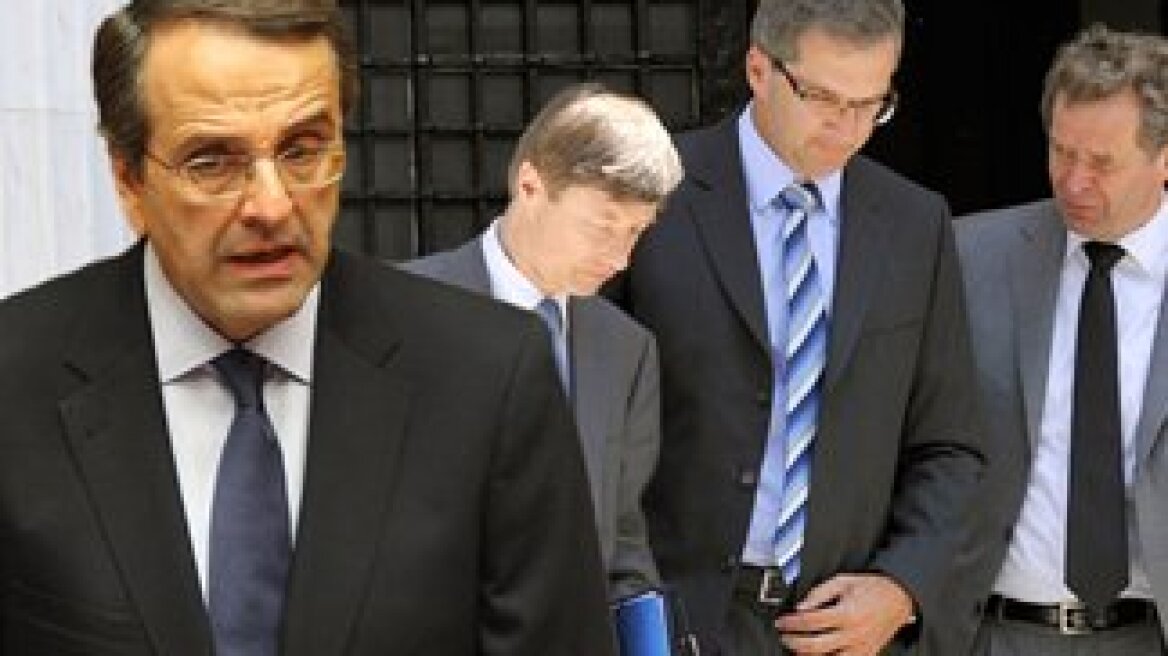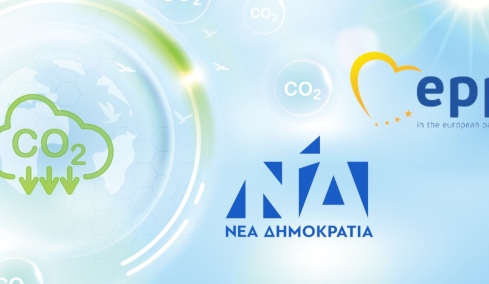
Crucial week to finalise the measures
Crucial week to finalise the measures
The Troika negotiations have entered the final round to close the package of 13.5 billion, as the government is pressed to catch up with the deadlines for the release of the tranche in early November.
UPD:
The Troika negotiations have entered the final round to close the package of 13.5 billion, as the government is pressed to catch up with the deadlines for the release of the tranche in early November.
Antonis Samaras is meeting with the the Troika auditors today at 6 pm. The Troika continues to object to the performance of the Greek government measures. The PM undertook personally the speeding-up of the structural changes in the ministries and the cuts by the end of the year, in order to persuade the Troika to overcome its objections. In this context he had separate meetings yesterday with Development minister Kostis Hatzidakis, Shipping minister Kostas Mourouroulis and secretary for Administrative Reform Manousos Voloudakis.
The Troika’s agreement is necessary in order for the rough package to make its way to parliament. Before that, however, the PM wants to close the measures with the Troika so as to pass them through the Eurogroup on the 8th of the month. He believes that their adoption will have the character of a guarantee that the summit on October 18 will make a decision on the release of the 31.5 billion euros. He considers that such a guarantee will calm the climate and help the package get voted for by the parliament. The PM wants to go to the summit with all the measures voted on. He is not even discussing the possibility of going to Brussels on October 18 without it, as suggested by Evangelos Venizelos and Fotis Kouvelis who are first or simultaneously seeking confirmation on the release and extension.
As for any decisions on the disbursement, the Troika should first publish its report which will also be an opinion on the viability of the Greek debt. But there is divergence here between the IMF, which wants a new debt restructuring, and the EU - especially Germany - which refuses any additional funding for Greece. Samaras wants to avoid the possibility of a postponement of the decision until after the U.S. elections or for the urgent summit in November or December. He wants the Greek issue to have been resolved before the start of the debate about the Eurozone debt crisis, from which he will seek benefits for our country. Although the government does not exclude the negative scenario, it wants any possible delays to be blamed on the lenders of our country and not on the Greek side.
Difficult voting
Antonis Samaras is meeting with the the Troika auditors today at 6 pm. The Troika continues to object to the performance of the Greek government measures. The PM undertook personally the speeding-up of the structural changes in the ministries and the cuts by the end of the year, in order to persuade the Troika to overcome its objections. In this context he had separate meetings yesterday with Development minister Kostis Hatzidakis, Shipping minister Kostas Mourouroulis and secretary for Administrative Reform Manousos Voloudakis.
The Troika’s agreement is necessary in order for the rough package to make its way to parliament. Before that, however, the PM wants to close the measures with the Troika so as to pass them through the Eurogroup on the 8th of the month. He believes that their adoption will have the character of a guarantee that the summit on October 18 will make a decision on the release of the 31.5 billion euros. He considers that such a guarantee will calm the climate and help the package get voted for by the parliament. The PM wants to go to the summit with all the measures voted on. He is not even discussing the possibility of going to Brussels on October 18 without it, as suggested by Evangelos Venizelos and Fotis Kouvelis who are first or simultaneously seeking confirmation on the release and extension.
As for any decisions on the disbursement, the Troika should first publish its report which will also be an opinion on the viability of the Greek debt. But there is divergence here between the IMF, which wants a new debt restructuring, and the EU - especially Germany - which refuses any additional funding for Greece. Samaras wants to avoid the possibility of a postponement of the decision until after the U.S. elections or for the urgent summit in November or December. He wants the Greek issue to have been resolved before the start of the debate about the Eurozone debt crisis, from which he will seek benefits for our country. Although the government does not exclude the negative scenario, it wants any possible delays to be blamed on the lenders of our country and not on the Greek side.
Difficult voting
The adoption of measures by the Greek parliament seems difficult. Democratic Left MPs have made it clear that they will not vote for the package and reservations have been expressed by PASOK and New Democracy MPs as well. The government hopes that the losses will be limited and will not challenge the political legitimacy of the measures. It watches with concern the destabilization of the political system due to the leaking of names of the politicians audited by SDOE. While the case is moving the focus away from the economy issues, it creates the risk of the affected members expressing their displeasure in another field. There are voices already in ND requesting to convene the parliamentary group and postpone the vote on the package for after the summit and following guarantees from the EU for the disbursement of the tranche and the extension of the fiscal adjustment program.
UPD:
Ακολουθήστε το protothema.gr στο Google News και μάθετε πρώτοι όλες τις ειδήσεις
Δείτε όλες τις τελευταίες Ειδήσεις από την Ελλάδα και τον Κόσμο, τη στιγμή που συμβαίνουν, στο Protothema.gr
Δείτε όλες τις τελευταίες Ειδήσεις από την Ελλάδα και τον Κόσμο, τη στιγμή που συμβαίνουν, στο Protothema.gr
ΡΟΗ ΕΙΔΗΣΕΩΝ
Ειδήσεις
Δημοφιλή
Σχολιασμένα








































